A próxima é já no dia 12 de Maio de 2021 das 17:00 às 18:00 em modo zoom (https://videoconf-colibri.zoom.us/j/86109989605)
A participação é gratuita e sem necessidade de inscrição.
Mais informações em:
—
Ana Madureira (ISEP/IPP)
AI for Intelligent Scheduling Systems
Zoom Online: https://videoconf-colibri.zoom.us/j/86109989605
About the Activity:
Scheduling is a critical function that is present throughout many industries and applications. A great need exists for developing scheduling approaches that can be applied to a number of different scheduling problems with significant impact on performance of business organizations. A challenge is emerging in the design of scheduling support systems for manufacturing environments where dynamic adaptation and optimization become increasingly important. In this lecture, Self-Optimizing Mechanism for Scheduling System through Nature Inspired Optimization Techniques will described.

[rede.APPIA] Fwd: Call For Papers – BRACIS’2021
Call For Papers
10th Brazilian Conference on Intelligent Systems (BRACIS)
http://c4ai.inova.usp.br/bracis/
Online Event
November 29 – December 03, 2021
>>>> Deadline for paper submissions: May 31, 2021 <<<<
>>>> CALL FOR PAPERS <<<<
The Program Committee of the 10th Brazilian Conference on Intelligent System (BRACIS) invites submissions of original research papers for the conference from November 29th to December 3th, 2021. Due to the COVID pandemic and the sanitary and economical related issues, the conference will be held online. BRACIS 2021 will be organized by C4AI Center for Artificial Intelligence (https://c4ai.inova.usp.br/).
BRACIS is the most important event in Brazil for researchers in the fields of Artificial and Computational Intelligence. The Brazilian Conference on Intelligent Systems (BRACIS) originated from the combination of the two most traditional scientific events in Brazil in Artificial Intelligence (AI) and Computational Intelligence (CI): the Brazilian Symposium on Artificial Intelligence – SBIA (21 editions ), and the Brazilian Symposium on Neural Networks – SBRN (12 editions). The conference aims to promote theory and applications of Artificial and Computational Intelligence. BRACIS also aims for the promotion of international level research by exchanging scientific ideas among researchers, practitioners, scientists, and engineers.
IMPORTANT DATES
– Paper submission – May 31, 2021
– Notification to authors – July 30, 2021
– Camera-ready copy due – August 19, 2021
SPECIAL ISSUES
Authors of selected papers will be invited to submit extended versions of their work to be appreciated for publication in special issues after the conference.
SUBMISSION DETAILS
*** Please, note that BRACIS submission is double-blind ***
This means that both the reviewer and author identities are concealed from the reviewers, and vice versa, throughout the review process. To facilitate this, authors need to ensure that their manuscripts are prepared in a way that does not reveal their identity.
Submissions should include significant and unpublished research on all aspects of Artificial Intelligence (AI) or Computational Intelligence (CI).
Submission format
Submitted papers must be written in English, and not exceed 15 pages, including all tables, figures, references, and appendices.
Formatting instructions, as well as templates for Word and LaTeX, are available at Conference Proceedings guidelines. Springer’s proceedings LaTeX templates are also available in Overleaf .
All submitted papers will be reviewed by at least three experts in the field. Accepted papers will be included in the BRACIS proceedings, and submitted for publication in Springer in Lecture Notes in Computer Science (LNCS) / Lecture Notes in Artificial Intelligence (LNAI) series.
Only PDF files can be uploaded in the submission system.
SUBMISSION SYSTEM
JEMS – Journal and Event Management System
https://jems.sbc.org.br/jems2/
TOPICS OF INTEREST
Topics of interest include (but are not restricted to):
-
Agent-based and Multi-Agent Systems
-
AI in Emerging Countries: Public Policies and the Future of Work
-
Bioinformatics and Biomedical Engineering
-
Cognitive Modeling and Human Interaction
-
Combinatorial and Numerical Optimization
-
Computer Vision
-
Constraints and Search
-
Decision Making in Food Production Networks
-
Deep Learning
-
Distributed AI
-
Education
-
Evolutionary Computation and Metaheuristics
-
Forecasting
-
Foundations of AI
-
Fuzzy Systems
-
Game Playing and Intelligent Interactive Entertainment
-
Graph-Oriented Machine Learning
-
Hybrid Systems
-
Information Retrieval, Integration, and Extraction
-
Intelligent Robotics
-
Knowledge-Enhanced Machine Learning
-
Knowledge Representation and Reasoning (including Commonsense Reasoning, Model-Based Reasoning, Probabilistic Reasoning, Approximate Reasoning)
-
Knowledge Representation and Reasoning in Ontologies and the Semantic Web
-
Logic-based Knowledge Representation and Reasoning
-
Machine Learning and Data Mining
-
Machine Learning for Medical Diagnosis
-
Meta-learning
-
Molecular and Quantum Computing
-
Multidisciplinary AI and CI
-
Natural Language Processing
-
Natural Language Processing in Portuguese
-
Neural Networks
-
Pattern Recognition and Cluster Analysis
-
Planning and Scheduling
-
Reinforcement Learning
GENERAL CHAIR
Reinaldo A. C. Bianchi, Centro Universitário FEI and C4AI
Zhao Liang, Universidade de São Paulo (USP) and C4AI
PROGRAM CHAIRS:
André Britto, Universidade Federal de Sergipe (UFS) (andre@dcomp.ufs.br)
_______________________________________________
[rede.APPIA] CFP: SoGood 2021– 6th Workshop on Data Science for Social Good (ECML-PKDD 2021)
Call for papers SoGood 2021 – 6th Workshop on Data Science for Social Good Affiliated with ECML-PKDD 2021, 13-17 September 2021 Workshop URL: https://sites.google.com/view/ecmlpkddsogood2021 This is the sixth edition of the workshop; the previous workshops were held jointly with ECML-PKDD 2016, 2017, 2018, 2019 and 2020. The possibilities of Data Science for contributing to social, common, or public good are often not sufficiently perceived by the public at large. Data Science applications are already helping in serving people at the bottom of the economic pyramid, aiding people with special needs, helping international cooperation, and dealing with environmental problems, disasters, and climate change. In regular conferences and journals, papers on these topics are often scattered among sessions with names that hide their common nature (such as "Social networks", "Predictive models" or the catch-all term "Applications"). Additionally, such forums tend to have a strong bias for papers that are novel in the strictly technical sense (new algorithms, new kinds of data analysis, new technologies) rather than novel in terms of social impact of the application. This workshop aims to attract papers presenting applications of Data Science for Social Good (which may, or may not require new methods), or applications that take into account social aspects of Data Science methods and techniques. There are numerous application domains, a non-exclusive list includes: * Government transparency and IT against corruption * Public safety and disaster relief * Access to food, water, and utilities * Efficiency and sustainability * Data journalism * Economic, social, and personal development * Transportation * Energy * Smart city services * Education * Social services, unemployment and homeless * Healthcare * Ethical issues, fairness, and accountability. * Trustability and interpretability Topics aligned with the UN development goals The major selection criteria will be the novelty of the application and its social impact. Position papers are welcome too. We are also interested in applications that have built a successful business model and are able to sustain themselves economically. Most Social Good applications have been carried out by non-profit and charity organisations, conveying the idea that Social Good is a luxury that only societies with a surplus can afford. We would like to hear from successful projects, which may not be strictly "non-profit" but have Social Good as their main focus. There will be an award for the best paper. Paper submission: Authors should submit a PDF version in Springer LNCS style using EasyChair. The maximum length of papers is 16 pages, consistent with the ECML PKDD conference submissions. Submitting a paper to the workshop means that if the paper is accepted, at least one author will attend the workshop and present the paper. Papers not presented at the workshop will not be included in the proceedings. In light of COVID-19, we will follow ECML PKDD’s policy for virtual attendance and presentation. Paper publication: Accepted papers will be published by Springer as joint proceedings of several ECML PKDD workshops. Workshop format: Full-day workshop 1-2 keynote talks, speakers to be announced Oral presentation of accepted papers Panel discussion with the audience
Rua Dr. António Bernardino de Almeida, 431
4249-015 Porto – PORTUGAL
tel. +351 228 340 500 | fax +351 228 321 159
mail@isep.ipp.pt | www.isep.ipp.pt
[rede.APPIA] Fwd: [Infos] EurAI Last call: conference sponsorship Autumn 2021 (extended deadline May 17!)
Dear EurAI societies,
Dear EurAI fellows,
We recall that EurAI sponsors invited talks at international conferences. The guidelines for eligibility and duties of sponsored conferences can be read at
https://eurai.org/apply_for/conference_sponsorship
Conference organizers who want to apply to funding for a conference that takes place before the end of December 2021 should apply **before May 17, 2021**.
The submission URL for EurAI Sponsorship is
https://forms.gle/basuf5A8xt26bicK9
There will be another call in autumn of this year for conferences that take place in the first half of 2022.
Best regards,
Catholijn Jonker, on behalf of
The EurAI board.
Prof. Dr. C.M. Jonker
Interactive Intelligence Group, Fac. EEMCS, TU Delft and
Explainable Artificial Intelligence, LIACS, Leiden University
Delft office: West6.600 in Building number 28
Delft phone: +31.15.2781315 (is active whenever my laptop is connected to the internet)
Mobile phone: +31.6.48875207
Websites: http://ii.tudelft.nl/~catholijn and catholijnjonker.nl
[rede.APPIA] DaSSWeb – Data Science and Statistics Webinar – 11 May – Info-metrics, by Pedro Macedo
DaSSWeb – Data Science and Statistics Webinar
Tuesday 11 May, 14:30
Speaker: Pedro Macedo University of Aveiro
Title: Info-metrics: some attractive tools for Data Science and Statistics
Zoom link: videoconf-colibri.zoom.us/j/83875914782
Abstract: Info-metrics is a research area at the intersection of statistics, information theory, computer science and decision analysis, where the maximum entropy principle, established by Edwin Jaynes in 1957, plays a fundamental role. The maximum entropy principle provides a tool for solving ill-posed problems that occur in diverse areas of science and it can be seen as an extension of the Bernoulli’s principle of insufficient reason. Some methodologies and related concepts from info-metrics will be briefly presented and illustrated in the webinar.
***********************************************************************
[rede.APPIA] Minha entrevista à Rádio Observador a 5 de Maio 2021
[rede.APPIA] Fwd: [Infos] Meet AIPlan4EU an AI planning technology project
AIPlan4EU is a project that focuses on AI planning technology and bringing it to innovators and practitioners.
Our first Open Call is ongoing and 5 use-case proposals will be funded.
These use cases can be from different sectors such as: space, agriculture, manufacturing, logistics, autonomous driving, automated experimentation, subsea robotics, or any others that prove to be relevant.
Overall, the project offers:
-
Funding €1500 per individual/SME in Open Call #1 for Use-Case.
-
The chance to be funded up to €30.000 to support the use-case implementation in the future open calls, including supporting the evaluation phase of these open calls.
-
Opportunities to connect with users and suppliers from various industries.
-
Access to a sustainable ecosystem of stakeholders active in multiple AI Planning domains.
Applications are open on F6S until 12 May 2021 at 17h00 CEST
https://www.f6s.com/aiplan4euopencall1usecase/apply
For more information, please visit AIPLan4EU’s website, or follow us on Twitter, LinkedIn, and Facebook



